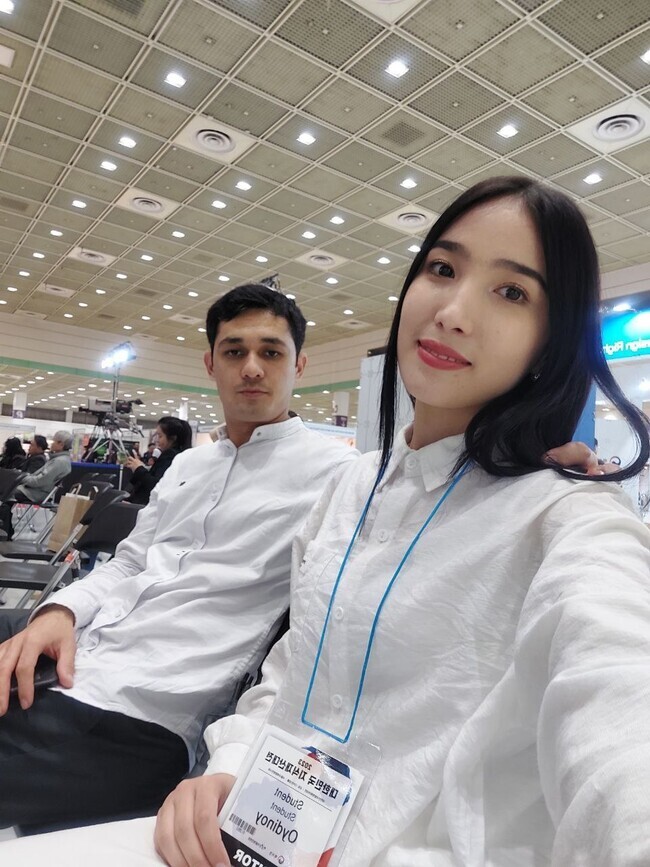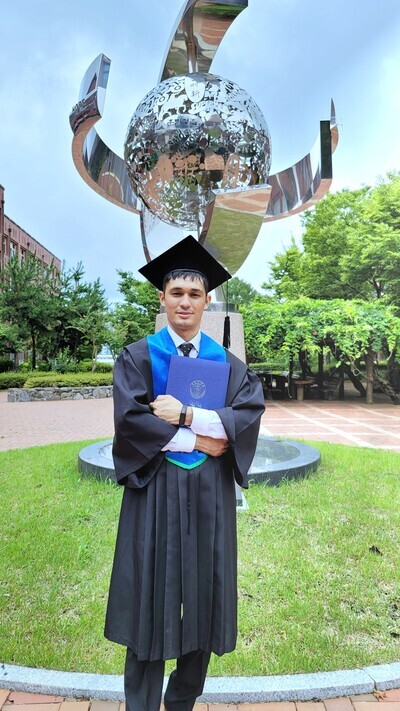hankyoreh
Links to other country sites 다른 나라 사이트 링크
[Interview] “Is this rule of law?”: Uzbek man says Korean school wrongfully deported wife

An Uzbekistan native living in Korea was forcibly separated from his wife after Hanshin University, where she was enrolled in Korean language classes, forced her on a plane back to Uzbekistan.
“I decided to do this interview because I think this is not simply a case in which people from a poor country have their rights violated,” Erkinjon Shokirov, 30, told the Hankyoreh.
Shokirov first came to South Korea in 2017. He completed his master’s program in political science at Gyeongsang National University. After earning his degree in 2020, he returned to Uzbekistan to work, and then came back to South Korea in August on a work-seeking visa.
While looking for jobs in his field, Shokirov is also waiting to hear back about his applications to PhD programs. His wife, Odyinoy Shokirova, 21, whom he married in October 2022, came to South Korea in September on a conditional visa. Her plan was to seek a degree and settle down with her husband in Korea after learning Korean.
On Nov. 27, Shokirov’s wife disappeared. Shokirova, along with 21 other Uzbeks at her school, had been sent back to Uzbekistan by Hanshin University.
After he hadn’t heard from his wife for a while, Shokirov asked her school friends about her whereabouts. They told him that she was at Incheon International Airport, about to be deported. Flustered, Shokirov immediately headed to the airport. He arrived at around 5:20 pm, but his wife’s plane had already departed.
“I couldn’t even see my wife before she left,” said Shokirov.
Hanshin University expelled Shokirova because she’d failed to maintain the minimum bank balance of 10 million won (US$7,598) required for sojourn in Korea. Shokirov had maintained the minimum bank balance from July 3 to Oct. 5, but since the account had been set up for her academic expenses, the money had been withdrawn to pay tuition as of Nov. 6, the day the school inquired into her financial status.
“The school told us that we needed to maintain the minimum bank balance for three months. But most students used that money to cover expenses that might arise while in Korea. I never thought the Korean government would view us as ‘foreigners who want to commit crimes’ simply because we’d withdrawn the money from our account,” Shokirov said.

Shokirov stressed that South Korea is a country of rule of law.
“South Korea is a land of law and order. If someone’s account balance is short, the school should alert that person and request the corresponding deposit. Just because someone withdraws that money, the university does not have the authority to take that person to the airport and force them out of the country without any prior warning. Is that what you’d call rule of law?” he said.
According to the Ministry of Justice’s “guidelines for international student visa issuance and sojourn management,” students must maintain the minimum bank balance for academic expenses “during the period of stay.” However, the guidelines assert that “in the case of a short-term withdrawal that results in a deficient balance, the student’s account should be examined again after a certain period of time has passed.”
“I’m aware of the concerns Koreans have about foreigners who come to their country and commit crime. Regarding immigration, the government’s most critical role is to protect its citizens and society from the illegal behavior of any foreign residents,” Shokirov said.
“Yet if such a government encourages or turns a blind eye to the illegal activity of an academic institution, how can you call South Korea a land of law and order?”
Showing the Hankyoreh a photograph of him and his wife, Shokirov seemed rife with worry. He was concerned about a tidal wave of hate and criticism that could direct itself toward him and his wife.
“For five years, Korea treated me very well. I made a living here, got an education here. I was happy. I hope people understand that my criticism is a reflection of the respect I have for this country,” he said.
By Lee Jun-hee, staff reporter
Please direct questions or comments to [english@hani.co.kr]

Editorial・opinion
![[Editorial] Intensifying US-China rivalry means Seoul must address uncertainty with Beijing sooner than later [Editorial] Intensifying US-China rivalry means Seoul must address uncertainty with Beijing sooner than later](https://flexible.img.hani.co.kr/flexible/normal/500/300/imgdb/original/2024/0517/8117159322045222.jpg) [Editorial] Intensifying US-China rivalry means Seoul must address uncertainty with Beijing sooner than later
[Editorial] Intensifying US-China rivalry means Seoul must address uncertainty with Beijing sooner than later![[Column] When ‘fairness’ means hate and violence [Column] When ‘fairness’ means hate and violence](https://flexible.img.hani.co.kr/flexible/normal/500/300/imgdb/original/2024/0516/7417158465908824.jpg) [Column] When ‘fairness’ means hate and violence
[Column] When ‘fairness’ means hate and violence- [Editorial] Yoon must stop abusing authority to shield himself from investigation
- [Column] US troop withdrawal from Korea could be the Acheson Line all over
- [Column] How to win back readers who’ve turned to YouTube for news
- [Column] Welcome to the president’s pity party
- [Editorial] Korea must respond firmly to Japan’s attempt to usurp Line
- [Editorial] Transfers of prosecutors investigating Korea’s first lady send chilling message
- [Column] Will Seoul’s ties with Moscow really recover on their own?
- [Column] Samsung’s ‘lost decade’ and Lee Jae-yong’s mismatched chopsticks
Most viewed articles
- 1[Editorial] Transfers of prosecutors investigating Korea’s first lady send chilling message
- 2For new generation of Chinese artists, discontent is disobedience
- 3S. Korea “monitoring developments” after report of secret Chinese police station in Seoul
- 4Xi, Putin ‘oppose acts of military intimidation’ against N. Korea by US in joint statement
- 5[Exclusive] Unearthed memo suggests Gwangju Uprising missing may have been cremated
- 6N. Korean media upgrades epithet for leader’s daughter from “beloved” to “respected”
- 7Yoon says concern about biased diplomacy is being incited by “communist totalitarian forces”
- 8[Editorial] Intensifying US-China rivalry means Seoul must address uncertainty with Beijing sooner t
- 9[Column] Samsung’s ‘lost decade’ and Lee Jae-yong’s mismatched chopsticks
- 10[Special reportage- part I] Elderly prostitution at Jongmyo Park